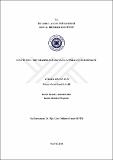Please use this identifier to cite or link to this item:
http://hdl.handle.net/11547/1405Full metadata record
| DC Field | Value | Language |
|---|---|---|
| dc.contributor.author | Saadi, Rebaz Ahmed Saadi | - |
| dc.date.accessioned | 2019-04-17T12:33:39Z | - |
| dc.date.available | 2019-04-17T12:33:39Z | - |
| dc.date.issued | 2018-05 | - |
| dc.identifier.uri | http://hdl.handle.net/11547/1405 | - |
| dc.description.abstract | Güçler ayrılığı ilkesi, demokratik sistemlerin dayandığı temel ilkelerden biridir, ve ulusun ve halkın egemenliği ilkesi kadar önemlidir. Bu esasa dayanarak, yapılan bu çalışmada 1748'de yazdığı "Yasaların Ruhu" adlı kitabında yasama, yürütme ve yargı ayrım ilkesini oluşturmayı tercih ettiği ünlü Fransız düşünür Montesquieu'ye atıfta bulumuştur, Ayrıca Montesquieu ve diğer düşünürlerin Fransa'daki demokratik sistem üzerindeki etkisini açıklanmıştır. Bununla birlikte güçler ayrılığı ilkesinin ortaya çıkışı ve ilkenin dayandığ (İngiltere, Fransa ve Amerika Birleşik Devletleri) gibi en önemli demokratik sistemlerinden bahsedildikten sonra, Iraktaki 1925 Kanun-i esasi, (1925-1958) yıllar arasındaki anayasaları, 2004 yılının geçici anayasası ve son olarak 2005 Daimi Anayasası'nın oluşumunu, eksiklilerini ve benimsedikleri sistemleri ve bu anayasalarda devlet güçleri neler olduklarını , dağıtımı nasıl olduğunu ve en son güçler dengesi açısandan bu anayasaların arasındaki benzerlik ve farklılıklar neler olduğunu ve bu anayasalarda özellikle 2005 Anayasasında demokratik temelleri ne kadar dikkate alındığını açıkalnmıştır. | tr_TR |
| dc.language.iso | tr | tr_TR |
| dc.publisher | İSTANBUL AYDIN ÜNİVERSİTESİ SOSYAL BİLİMLER ENSTİTÜSÜ | tr_TR |
| dc.subject | Güçler dengesi | tr_TR |
| dc.subject | Güçler Ayrılığı İlkesi | tr_TR |
| dc.subject | 1925 Irak Kanun-ı Esasi | tr_TR |
| dc.subject | 2005 Irak Daimi Anayasası | tr_TR |
| dc.subject | Powers Balance | tr_TR |
| dc.subject | Principles for the Separation of Powers | tr_TR |
| dc.subject | 1925 Iraq Law-Constitution | tr_TR |
| dc.subject | 2005 Standing Constitution of Iraq | tr_TR |
| dc.title | IRAK'IN 1925 – 2005 ARASINDAKİ ANAYASALARINDA GÜÇLER DENGESİ | tr_TR |
| dc.type | Thesis | tr_TR |
| dc.description.abstractol | The principle of separation of powers is one of the basic principles on which democratic systems are based, and is as important as the rule of nation and people's sovereignty. Based on this essay, this work finds the famous French philosopher Montesquieu, who, in his book "The Spirit of the Laws" he wrote in 1748, chose to establish legislative, executive and judicial segregation principles. He also explained the influence of Montesquieu and other thinkers on the democratic system in France. However, after mentioning the most important democratic systems, such as the emergence of the principle of separation of powers and the primacy of the United Kingdom (Britain, France and the United States of America), the Constitution of 1925, the temporary constitution of the year 2004 (1925-1958) What constitutes the constitution of the 2005 Permanent Constitution and the systems it adopts and what state powers are in these constitutions and how they are distributed and what similarities and differences between these constitutions are in terms of the latest balance of power and how these democratic constitutions are taken into account especially in the Constitution of 2005. | tr_TR |
| Appears in Collections: | Tezler -- Thesis | |
Files in This Item:
| File | Description | Size | Format | |
|---|---|---|---|---|
| IRAK'IN 1925 – 2005 ARASINDAKİ ANAYASALARINDA GÜÇLER DENGESİ.pdf | Yüksek Lisans Tez Dosyası | 1.31 MB | Adobe PDF |  View/Open |
Items in DSpace are protected by copyright, with all rights reserved, unless otherwise indicated.
